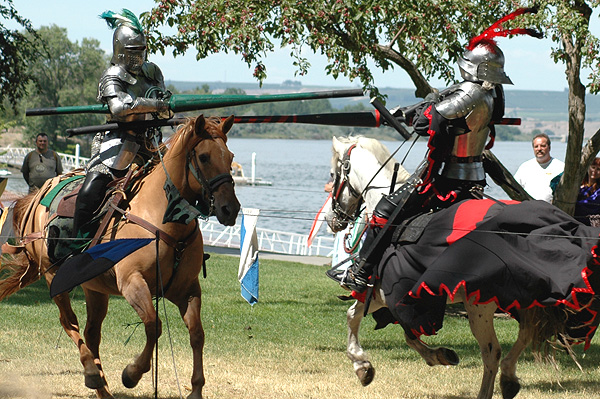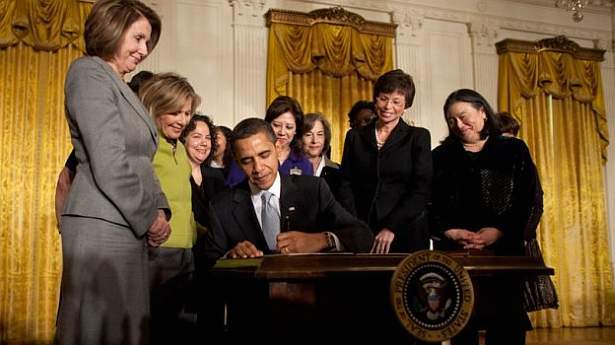I have a Google alert for the word chivalry, and not a day goes by that I don’t receive several articles on the topic. The articles appear slightly tilted toward the theme ‘Male chivalry is dead,’ followed by a reasonable number demonstrating ‘Chivalry is alive and well’ – the latter because some man, somewhere, risked life, limb or money to serve a woman’s immediate welfare.
To be sure, chivalry displayed by individual men is on the decline and women, men, government and mainstream media denounce this devolution with one voice: Men are becoming selfish pigs. MRAs and MGTOW choose to summarize it differently; that men are sick of being exploited and have chosen to shed their unnecessary selflessness.
Chivalry is documented in etiquette manuals of prior centuries explaining how a man is to take off his hat in a woman’s presence, shake her hand, open doors, buy her gifts, and assist her in a multitude of ways. The message in these gestures is deference to the superiority of females:
“If you see a lady whom you do not know, unattended, and wanting the assistance of a man, offer your services to her immediately. Do it with great courtesy, taking off your hat and begging the honour of assisting her.” [Gynocentric etiquette for men – 1847]
“In the familiar intercourse of society, a well-bred man will be known by the delicacy and deference with which he behaves towards females. That man would deservedly be looked upon as very deficient in proper respect and feeling, who should take any physical advantage of one of the weaker sex, or offer any personal slight towards her. Woman looks, and properly looks, for protection to man. It is the province of the husband to shield the wife from injury; of the father to protect the daughter; the brother has the same duty to perform towards the sister; and, in general, every man should, in this sense, be the champion and the lover of every woman. Not only should he be ready to protect, but desirous to please, and willing to sacrifice much of his own personal ease and comfort, if, by doing so, he can increase those of any female in whose company he may find himself. Putting these principles into practice, a well-bred man, in his own house, will be kind and respectful in his behaviour to every female of the family. He will not use towards them harsh language, even if called upon to express dissatisfaction with their conduct. In conversation, he will abstain from every allusion which would put modesty to the blush. He will, as much as in his power, lighten their labors by cheerful and voluntary assistance. He will yield to them every little advantage which may occur in the regular routine of domestic life:—the most comfortable seat, if there be a difference; the warmest position by the winter’s fireside; the nicest slice from the family joint, and so on.” [Gynocentric etiquette for men – 1873]
“It must always be borne in mind that the assumption of Woman’s social superiority lies at the root of these rules of conduct.” [Gynocentric etiquette for men – 1897]
One reason for a decline of male chivalry is the vanishing payoff. Women no longer reciprocate for chivalry via good ol fashioned gestures like cooking, homemaking, praise, and affection that would have occurred at the time the above comments were penned. Today they don’t even receive a thank you… is it any wonder men are seeing chivalry as a bad deal? The meal ticket, the flowers, the slaving at a job, the deference is all better spent on oneself.
Despite the hand-wringing over a decline in chivalry, women appear to be doing very well for themselves; they are well decked out with material goods, they display increasing body-freedom and body-pride, and their entry into workplace and careers is unprecedented. Society continues to indulge them as much as it ever did – more.
With this bare fact one might ask if chivalry merely appears to be on the decline and if women are receiving it from another source? My observation – obvious to many in the manosphere – is that they have corralled a rich new source of chivalry.
From Husband Sam to Uncle Sam
This heading is from Dr, Warren Farrell’s Myth of Male Power, where he describes how men have traditionally striven to institute women-centered government by acting as women’s proxy agents in the political sphere. This behavior, explains Farrell, is based on the chivalrous tradition of male servicing of women’s needs. The following passage from Farrell’s book explains the phenomenon:
“Doesn’t the fact that almost all legislators are men prove that men are in charge and can choose when to and when not to look out for women’s interests? Theoretically, yes. But practically speaking the American legal system cannot be separated from the voter. And in the 1992 Presidential election , 54 percent of the voters were female, 46 percent were male. (Women’s votes outnumber men’s by more than 7 million). Overall, a legislator is to a voter what a chauffeur is to the employer – both look like they’re in charge but both can be fired if they don’t go where they’re told. When legislators do not appear to be protecting women, it is almost always because women differ on what constitutes protection. (For example, women voted almost equally for Republicans and Democrats during the combination of the four presidential elections prior to Clinton).
“The Government as Substitute Husband did for women what labor unions still have not accomplished for men. And men pay dues for labor unions; the taxpayer pays the dues for feminism. Feminism and government soon become taxpayer-supported women’s unions. The political parties have become like two parents in a custody battle, each vying for their daughter’s love by promising to do the most for her. How destructive to women is this? We have restricted humans from giving “free” food to bears and dolphins because we know that such feeding would make them dependent and lead to their extinction. But when it comes to our own species, we have difficulty seeing the connection between short-term kindness and long-term cruelty: we give women money to have more children, making them more dependent with each child and discouraging them from developing the tools to fend for themselves. The real discrimination against women, then, is “free feeding.”
Ironically, when political parties or parents compete for females’ love by competing to give it, the result is not gratitude but entitlement. And the result should not be gratitude, because the political party, like the needy parent, becomes unconsciously dependent on keeping the female dependent. Which turns the female into “the other” — the person given to, not the equal participant. In the process, it fails to do what is every parent’s and every political party’s job — to raise an adult, not maintain a child.
But here’s the rub. When the entitled child has the majority of the votes, the issue is no longer whether we have a patriarchy or a matriarchy — we get a victimarchy. And the female-as-child genuinely feels like a victim because she never learns how to obtain for herself everything she learns to expect. Well, she learns how to obtain it for herself by saying “it’s a woman’s right” — but she doesn’t feel the mastery that comes with a lifetime of doing it for herself. And even when a quota includes her in the decision-making process, she still feels angry at the “male dominated government” because she feels both the condescension of being given “equality” and the contradiction of being given equality. She is still “the other.” So, with the majority of the votes, she is both controlling the system and angry at the system.” [The Myth of Male Power]
Do we need further evidence of “what ever happened to chivalry?” Not only have politicians taken over the job of chivalric appeasement of the ladies, it appears both the Left and Right of politics are jousting each other for the privilege to serve them. This I can understand… how else might they get elected?
John Stuart Mill, champion of feminism, urged shifting of the responsibility for chivalry out of the hands of every man and into the legislative framework of government proper, contending that chivalry was not always reliable and thus must give way to a more reliable, State-enforced protection and benevolence toward women. He writes:
“From the combination of the two kinds of moral influence thus exercised by women, arose the spirit of chivalry: the peculiarity of which is to aim at combining the highest standard of the warlike qualities with the cultivation of a totally different class of virtues – those of gentleness, generosity, and self-abnegation towards the non-military and defenseless classes generally, and a special submission and worship directed towards women; who were distinguished from the other defenceless classes by the high rewards which they had it in their power voluntarily to bestow on those who endeavoured to earn their favour, instead of extorting their subjection…
The main foundations of the moral life of modern times must be justice and prudence; the respect of each for the rights of every other, and the ability of each to take care of himself. Chivalry left without legal check all those forms of wrong which reigned unpunished throughout society; it only encouraged a few to do right in preference to wrong, by the direction it gave to the instruments of praise and admiration. But the real dependence of morality must always be upon its penal sanctions – its power to deter from evil. The security of society cannot rest on merely rendering honour to right, a motive so comparatively weak in all but a few, and which on very many does not operate at all.” [J. S. Mill: The Subjection of Women – 1869]
Ernest B. Bax confirms that the chivalric behavior of both Left and Right of politics was indeed, per Mill’s suggestion, well underway by the year 1907:
“All parties, all sorts and conditions of politicians, from the fashionable and Conservative west-end philanthropist to the Radical working-men’s clubbite, seem (or seemed until lately) to have come to an unanimous conclusion on one point – to wit, that the female sex is grievously groaning under the weight of male oppression.” [Essays: New & Old (1907), pp.108-119]
Feminism draws its strength from chivalry, but instead of soliciting chivalry from men in the traditional, interpersonal manner it has learned how to get it solely from the government – holding the government to ransom thanks to suffragettes gaining the vote for gynocentrism women.
Instead of men giving up seats in buses, government now provides seats in legislative assemblies and boardrooms via quotas. Instead of men opening car doors for women, government opens doors into universities and workforces via affirmative action. Instead of men being the sole protectors of women from violence, government now protects them with an army of police specially trained to service women’s accusations (over and above more serious crimes). Instead of men providing living expenses, governments now provide it as social welfare and compensation for the ‘wage gap’. Etc. ….. government as substitute husband.
All this compliments of feminism’s pressuring the Left and Right into chivalric leadership. The only difference between the two sides of politics is that the Left is more sycophantic in its deliverance of chivalric rule – and the Right more heroic in its deliverance of chivalry. Same gynocentrism, different knight.
Gynocentric chivalry was an unbalanced idea to begin with. Men are now backing away from the custom, and we can yearn for the day government on both sides on the political fence does the same. Perhaps when the world’s growing army of grass eaters brings about a collapse in revenue they will see the light. In the meantime, let’s not give feminists a pass on their claim to have walked away from chivalry…. they have merely found a new source.

